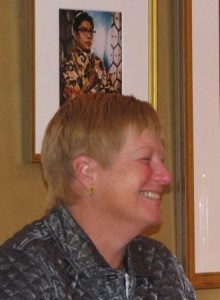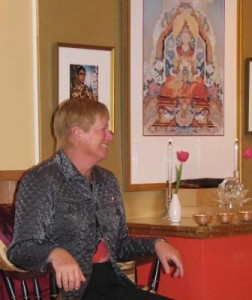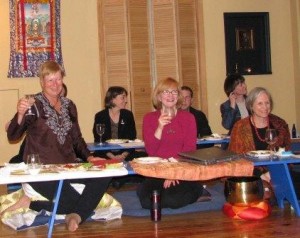Thursday
Dharma TeachingsGenerosity Is the Foundation of Enlightened Society, by Lady Diana Mukpo
Together, we are marking the 22nd anniversary of the passing of the Vidyadhara. A friend of mine recently called me and said, “Well… I called you to wish you, I don’t know what to say, should it be… I called to wish you, I don’t know what to say, should it be a cheerful Parinirvana?”
This is a very good time to reflect on the life of this one human being and the incredible gift he gave us. So much of what we have is because of his generosity and commitment. Twenty-six years ago, the Vidyadhara said, “The world is beginning to lose its sanity; it is our responsibility to give sanity to the world.” I believe that in those 26 years the world has lost its sanity. We are in a worse predicament now than we were at the time he said those words. We really are in the Dark Age.
A great hallmark of the Vidyadhara is that he took his responsibility to heart. He didn’t talk about creating enlightened society: he did it. He created it on the spot. Because of his feelings of responsibility toward students and other sentient beings were so strong, he devoted every moment of his life to accomplishing Shambhala. In our Homage and Invocation chants we call this “the golden yoke of the Imperial rule.” The Vidyadhara wore that golden yoke with majesty and took great pleasure in his responsibility. He gave us so much to be grateful for. We are just beginning to unravel the incredibly profound teachings he offered, something we won’t be able to complete in this lifetime.
Chogyam Trungpa’s life is also an example to us. On an individual basis, in our own way, each of us can work as hard as he did. If it hadn’t been for the Vidyadara, we would not have this notion of creating enlightened society. He showed us ways we could create awakened society on the spot − whether in our domestic situation or at our center. Within everything we do, there is always the possibility of a culture and an environment based on waking up, with an allegiance to sanity. As students of the buddhadharma, that allegiance forms the basis of all our activity.
One could say that the way the Vidyadhara lived his life was extraordinarily unconventional. I’m sure many of you remember various situations or have heard some wild stories. And yet, he was also extraordinarily conventional.
Chogyam Trungpa was a link in a profound lineage that started 2,500 years ago with the Buddha. Originally started in India, buddhadharma spread through Southeast Asia, and then was brought to Tibet and China. The reason buddhadharma has survived so beautifully in many different cultures is that it developed a different manifestation for each cultural style. It has been able to morph, so to speak, and actually work within individual cultural contexts. In this way, the Vidyadhara was a pioneer. This was an incredibly profound role because, to a certain extent, he had to turn Tibetan tradition upside down to make buddhadharma work in the West. So much of his brilliance was his tremendous foresight. Even when the Vidyadhara was a young child in Tibet he began to think about how the Buddhist teachings were going to become transformative in the future.
Chogyam Trungpa was the child of simple peasant family. In fact, he was not allowed to be born inside the tent where the family lived. He was born into very, very humble circumstances. But by the time he was 15 months old he had been recognized as the 10th Trungpa Tulku and was taken to his monastery and enthroned there. He received a traditional education and was very clever and very brilliant. At a relatively early age, he was recognized as a Terton, which literally means “Treasure Finder.” In the Tibetan tradition, Tertons have the capacity to discover hidden teachings, either physically unearthing them or receiving them through the essence of mind. These teachings were hidden long ago, with the intention that they be discovered at a time when they are most needed and appropriate for the world’s circumstances.
Throughout the Buddhist tradition, there is a history of teachers living very austere lifestyles while they practiced and developed themselves. Even if they were born into regal situations, they relinquished their riches and responsibilities and turned to a simplified life of meditation. As we know, 2,500 years ago Gautama Buddha was born as a prince. In order to become fully realized, he left his palace and adopted a very austere lifestyle. He practiced, achieved enlightenment, and then dedicated his life to teaching others. Padmasambhava made a similar choice. Milarepa ate nettles and wore very little clothing. Throughout Tibet, yogis would give up everything and live in caves.
.
That continued to be the tradition while the Vidyadhara was growing up in Tibet. But from quite an early age, he began to wonder if it would be possible for things to work in the opposite direction. Could someone as simple as a monk become regal – or even become a king? He wrote a poem about this for his teacher Jamgon Kongtrul Rinpoche. And Jamgon Kongtrul said, “Be careful, but at the same time if you are too careful, we may lose our teachings and the power of our teachings. You have to make everybody decent people and then you can actually turn the wheel and conquer them.”
It became a joke between them – that in order for buddhadharma to start, the king had to become a monk. But for the Buddhadharma to continue to flourish, it is exactly the opposite situation. We can understand that on many levels. To a certain extent, it is metaphoric, but Padmasambhava – one of the great Buddhist saints – also predicted that we’re going to have a 2,500 year Dark Age that would only come to an end when the Imperial yana arose.
I believe that as a child, the Vidyadara knew that he was going to end up in the West. He had very powerful dreams that this was going to be his future. As catastrophic as it was, when the Chinese invaded Tibet and completely decimated that culture, the dharma finally left Tibet. Some say that through this terrible situation the container for dharma shattered. But on the other hand, if Tibet had not been forced open and the Vidyadhara forced to leave, we in the West would never have reaped the benefit of these teachings.
Our culture is extraordinarily different from the cultures of Tibet and Asia. When the Vidyadhara arrived, there wasn’t any cultural support for people to study Buddhism and practice meditation. Our society is much more complex because we have to be householders. While many of us are fortunate to be able to find time to practice and go on retreats and so forth, we also have a modern lifestyle in which we raise our families and create some sort of livelihood. These are not second-rate activities at all, because once we begin to understand how we can be majestic within our world, we connect with our fundamental inner confidence. Then we create Shambhala society on the spot. Enlightened society happens on the spot.That is how the Vidyadhara was quite conventional — in order for the fundamental wisdom and purity of the buddhadharma to work for us in North America, the forms had to undergo a metamorphosis. But the principles of the nature of human mind and the obstructions to connecting with basic sanity are the same across time and place, and need to be continually worked with. The Vidyadhara’s ability to navigate this was based on his complete confidence and mastery of the teachings.
As all of us look toward creating enlightened society through wakefulness in our lives, we are following the bodhisattva path. If we have a commitment to bringing sanity into our lives and all aspects of our world, we first need to get out of our own way. As long as we are self-obsessed or caught up in ourselves, without a way to work with our neurosis, we have extraordinarily myopic vision. The path out of this swamp teaches us how to work with obscurations and obstructions. This allows us to create wakeful situations. An allegiance to enlightened society takes us beyond ego, beyond our particular hang-ups, and helps us achieve clarity so we can see what other people need and what the world is asking of us. An allegiance to wakefulness forces us to get out of our own way.
All of you are probably familiar with the paramitas, the transcendent virtues. In Sanskrit, the word paramita literally means, “to be able to cross over to the other shore.” These virtues are the means by which we cross over from a state of constant obscuration to a mind of sanity. We are fortunate to have a structure and a method for doing this. Before we had access to the teachings, many of us had many brilliant ideas about how we were going to change our lives and society. But there was no method and no structure – it felt like trying to build a house without a foundation. That house fell down over and over again because the same fundamental problem was constantly in our way. The buddhadarma has provided us with the proper structure for building our house: first there is the foundation and a sense of discipline. This discipline is based on 2,500 years of accumulated wisdom. .
I’d like to talk about the paramita of generosity because today we are marking the 22nd Parinirvana of the Vidyadhara, whose profound, unbelievable generosity offers a potent example. Throughout his life, the Vidyadhara would say or do anything he could to improve the lives of other people. He might have lived longer had he not been so generous. He worked tremendously hard.
Shortly after I married the Vidyadhara, it became clear that there was no possibility at that time for him and his particular style to plant the banner of dharma in England. And he wanted to move on. He received an invitation from Hong Kong to become a professor of Tibetan at the University of Hong Kong. He could have led a very comfortable life (though I was somewhat terrified at the prospect) but he rejected the offer. Instead, we came to North America and encountered an unbelievably chaotic situation. We had nothing, and it was very hard. The Vidyadhara was inspired to teach here, and as his style developed he taught Buddhism in a traditional way. From the Kagyu lineage, he presented the three yanas – very systematically, he taught the Hinayana, Mahayana, and Vajrayana. Then as a culmination, he taught the Kalapayana, the Imperial yana of the Shambhala teachings. These include the extraordinarily profound terma teachings which his son, Sakyong Mipham Rinpoche, is continuing. I know the Vidyadhara felt that these teachings were the future of buddhadharma in the West.
Even when we had very, very little, the Vidyadhara was constantly displaying generosity on many levels. On a basic level, we are in incredibly difficult economic times right now. But generosity is not simply giving material goods – when we look at the paramitas we need to go beyond the conventional sense. The first notion of generosity is that we take on a feeling responsibility for the well-being of other people. Sometimes we feel poverty-stricken and are convinced that we have very little to give. But as soon as we take our seat, as an individual we can become the monarch of our own situation. Once we really believe that and know that we can afford to give to others, we have tremendous confidence and ability to give. We need to go beyond our comfort zone, take responsibility for the well-being of others, and push ourselves beyond comfort. While we may have little money, we can still invite people to dinner. Some days you might have houseguests and while you have a miserable hangover, this person really wants your time and energy. You would prefer to go into a cocoon and spend the day in your bedroom, but instead you push yourself out. The Vidyadhara did that constantly. He gave up all notion of privacy, all notion of personal comfort and constantly invited people into his situation. As a result we have what we have today, which is very precious.
Generosity is not just giving things away. It’s about taking responsibility. We may do that by becoming teachers ourselves. As we begin to embody the teachings and process ourselves, we realize that we actually have a tremendous amount to give. There is a sense of having accomplished the discipline and our practice. We trust in our own heart and are constantly aware that we have a responsibility to others. This was the foundation of the Vidyadhara’s life. We too can build our lives on a basic sense of generosity. This is the foundation of enlightened society, of Shambhala society.




















Jul 17, 2012
Reply
When we can see the reality that no teacher is capable of showing us some hidden truths, that it is ultimately up to us, only then we can be free of religious dogmas or practices, whether traditional or new age.
Apr 11, 2009
Reply
Dear Jennifer,
Thank you so much for posting (and transcribing?) this piece. Lady Diana’s insight into the mind of the Vidyadhara always strikes me as spot-on. She has an uncanny ability to draw out certain aspects of his life that relate directly to what we are all facing. Here’s wishing her many years as our reigning Druk Sakyong Wangmo.
Cheers,
Lodro Rinzler